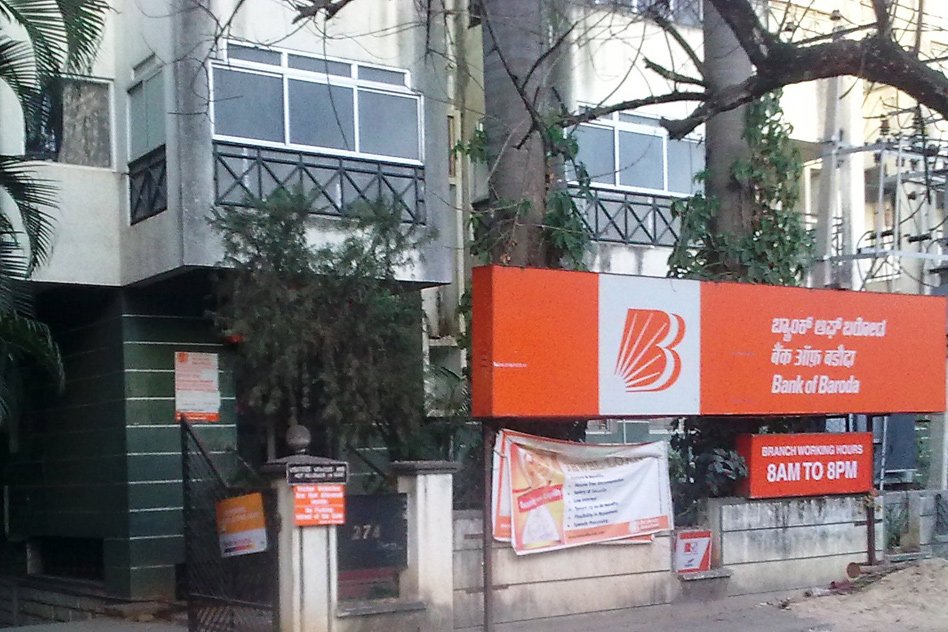News Source:Indian Express,Economic Times,Business Standard, Image Source: wikimapia
Bank of Baroda had a tough day when CBI and Enforcement Directorate (ED) carried out searches at its branches in connection with the alleged Rs 6100 crore black money which was transferred to Hong Kong. All together six people have been arrested in what is now known as the Forex scam.
Joint team of CBI and ED conducted searches at three premises including residences of Bank of Baroda’s AGM SK Garg and Jainesh Dubey, foreign exchange officer with the bank. As per The Indian Express report, CBI said the two officials have been found to be involved in the illegitimate transfer of the amount to Hong Kong. Accounts of 60 companies opened at the Ashok Vihar branch of the bank in Delhi, a relatively new branch are under scanner.
The case was registered after the bank found unusual remittances during an audit of its accounts. CBI had registered the case on a complaint from the bank under the sections of Indian Penal Code and Prevention of Corruption Act against 59 current account holders and unknown bank officials and private persons. CBI had found documents related to the illegitimate money transfers.
As per the published report in Economic Times, the bank too is probing the matter independently and will see if its software systems were adequate and lived up to the promise of sensing suspicious transactions.
The new branch of Bank of Baroda had obtained permission to accept forex transactions in 2013 after which, forex business of its Delhi branch sore up to RS 21,529 crore. The bank is now functioning without an MD and CEO. Though the government has appointed VBHC Value Homes managing director and CEO PS Jayakumar as the new managing director of Bank of Baroda in August, he is yet to take charge. Bank of Baroda detected a Rs 350 crore bill discounting irregularity and initiated an investigation into the matter. The bank discounted bills worth Rs 350 crore but the payment never came.
MODUS OPERANDI
The scam is traced to HDFC bank accounts. Prima facie it seems that two different types of transactions took place, but they can be related.
In the first transaction, dummy companies were opened in Hong Kong. The exporter, who had foreign exchange black money stashed abroad, used these entities as clients who sent the black money to India to make the transaction look genuine. Government on receiving the foreign exchange disbursed the duty drawback money to the exporter since the entire transaction was closed. Government uses the duty drawback scheme to promote exports in which refund is given by the government to recoup the amount paid by way of custom and excise duties on the raw materials used and service tax used for the manufacture of exported goods.
As per the report in Business Standard, the problem as ED states is that the traders evaded custom duties and over-claim duties to generate slush funds. Through this mechanism, two purposes were achieved. First, the unaccounted black money residing abroad come to India as white money and the exporter also generates extra income by duping the government through its own export incentive schemes.
Bank of Baroda in its communication to the stock exchanges said that between May 2014 and August 2105, 5853 outward foreign remittances of Rs 3,500 crore for the purpose of advance remittances was recorded. Funds were sent through 38 current accounts to various overseas parties numbering to 400, based in UAE and Hong Kong.
The modus operandi in this transaction was that a number of current accounts were opened in the Ashok Vihar branch. As per our banking system, a remittance of up to $100,000 is automatically cleared. The money launderers smartly exploited this loophole to pass under the radar. They selected the commodities which are prone to cancellations on account of quality or sharp price fluctuations like fruits and rice.
ED arrested Kamal Kalra, working with the foreign exchange division of HDFC bank and three other individuals – Chandan Bhatia, Gurucharan Singh Dhawan and Sanjay Aggarwal (none of them working with the bank).
ED said that Kalra was helping Bhatia and Aggarwal in remitting the amount through BOB against a commission of 30-50 paise per dollar remitted abroad.
Bhatia’s role was in forming companies in India and remitting money to the companies based in Hong Kong, Dhawan, an exporter of garments helped Bhatia. He allegedly obtained duty drawback to the tune of Rs 15 crore in a short period of 6-7 months.
RULES THAT WERE NOT FOLLOWED
The entire scam came out of cocoon because the banks officials pointed out the suspicious transactions to the investigating agencies. Banks are expected to raise exceptional transaction report and suspicious transaction report with the RBI in case of discrepancies. The delay in pointing out these discrepancies resulted in the scam gaining momentum.
UNANSWERED QUESTIONS
Since the operations started in August 2014, its planning would have taken a few months earlier, which coincides with the coming to power of the new government. The advance remittances to import scheme has been put to use transfer black money out of India on fears of it being detected.
One needs to know, whose money it is and how such a huge amount went unnoticed.











